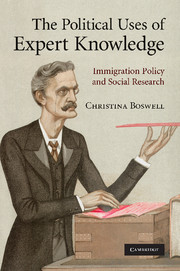Book contents
- Frontmatter
- Contents
- List of figures and tables
- Acknowledgements
- I The political functions of knowledge
- II The case of immigration policy
- 5 The politics of immigration in Germany and the UK
- 6 The British Home Office
- 7 The German Federal Office for Migration and Refugees
- 8 The European Commission
- 9 Organizations and cultures of expertise
- III Extending the theory
- References
- Index
9 - Organizations and cultures of expertise
Published online by Cambridge University Press: 15 December 2009
- Frontmatter
- Contents
- List of figures and tables
- Acknowledgements
- I The political functions of knowledge
- II The case of immigration policy
- 5 The politics of immigration in Germany and the UK
- 6 The British Home Office
- 7 The German Federal Office for Migration and Refugees
- 8 The European Commission
- 9 Organizations and cultures of expertise
- III Extending the theory
- References
- Index
Summary
The last three chapters have followed the fate of new research programmes established in three European administrative organizations dealing with immigration policy. In each case, the organizational narrative around the new research capacity was about the instrumental, or problem-solving, functions of knowledge. But as we saw, in reality these bodies performed a far wider array of functions. In the case of the European Commission, its new research group served as a sounding board for controversial initiatives. In the UK Home Office, the research programme produced findings that substantiated the government's position. And in both the Home Office and its German counterpart, the Federal Office for Migration and Refugees, researchers were enlisted to provide more applied ‘management information’ that would normally have been produced by other departments or external consultants. Perhaps most importantly, in all three cases the new research capacity helped signal the organization's competence in making decisions on migration, or that it was in line with modish notions of evidence-based policymaking.
Of course, all three cases focus on one particular channel for procuring expert knowledge: an in-house research capacity. In this sense, we can expect the findings to be biased towards the legitimizing function of knowledge. Being able to demonstrate that the organization possesses its own knowledge resources may be a particularly effective way of signalling legitimacy. Had I chosen to focus on externally commissioned work, the findings may have been relatively skewed towards substantiating or instrumental knowledge utilization.
- Type
- Chapter
- Information
- The Political Uses of Expert KnowledgeImmigration Policy and Social Research, pp. 219 - 230Publisher: Cambridge University PressPrint publication year: 2009



